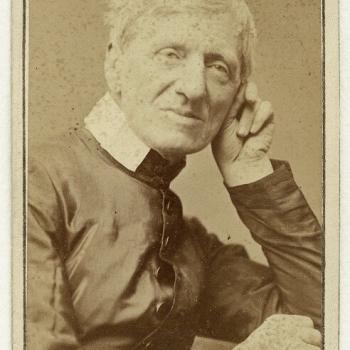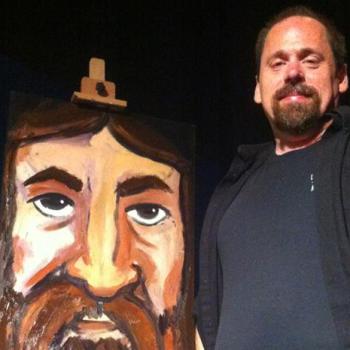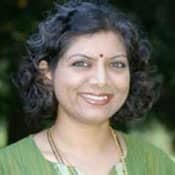Along with five friends who are also board members of a non-profit called WISDOM, I recently took our signature program, "Five Women, Five Journeys: How Different Are We?" along with the companion book, Friendship and Faith, on the road to northern Michigan, to the Bay View Association. We were staying overnight to present as an interfaith panel, answering the same questions, sharing our stories.
The Bay View Association is a seasonal Victorian cottage community in Petoskey, MI, founded in 1875 by Michigan Methodists as a camp meeting "for intellectual and scientific culture and the promotion of the cause of religion and morality." Also, according to its website, "from its beginning, the Association has welcomed persons of any denominational affiliation who have desired to assist in perpetuating the Association's principles and purpose." During the panel, we spoke of friendships formed across religious lines by presenting our personal faith journeys.
According to my hostess, my five friends—a Bahai, a Catholic, a Jew, a Muslim and a Presbyterian—and I, the sole Dharmic/Eastern tradition representative, showed our solidarity and embodied the ability to form relationships with those different from ourselves. We ended the evening with a meaningful rendition of Let There be Peace on Earth—our book's subtitle suggests this: "the wisdom of women forming alliances for peace"—sung with an engaged and engaging audience.
Each of us stayed with a different family that evening—my hosts were vegetarian like me—and their son's wonderful dog Chaucer reminded me of how our pets (and other people's) humanize us. Chaucer was aging, and yet more alert to the behavior of Mother Nature than I ever can be. She barked at the onset of a coming summer morning thunderstorm, and trembled as she sat by us as we shared morning coffee amid the booming and lightening—reminding me of the frailty of our fellow beasts, and the grandeur of God's creation. I exchanged hugs, email addresses, and book titles with my hosts before I left, and stored a photo of them on my Blackberry that gave me cause to smile when I shared it with friends and family. Friendship shared, friendship formed.
I am thankful that I had such an experience prior to finishing the book, What a Friend We Have: Unleashing Christianity's Compassion for Animals by Laura Hobgood-Oster! I had much reflection and meditation to do as I went through the book. This could have been an easy read had I not taken to heart and struggled with what the author put in its pages. The book is filled with amazing theological history and lays out religious-environment theology. It connected me to aspects of Christianity that I know and taught me even more. It lay down a philosophy of compassion, hospitality and friendship for the creatures we share our planet with, and yet called on me to raise the bar on my activism for pluralism—to include all of creation in my work towards acceptance.
For me, Hobgood-Oster fulfilled what she was attempting to do: "find those animal voices in Christianity, voices that I believe strengthen and enrich the tradition immensely." She gave me statements to use in my advocacy work for Hindus, by quoting In Memory of Her by Elisabeth Schussler Fiorenza: "to interrupt hegemonic historical discourse"—and that "current scholarly theory and research are deficient because they neglect women's lives and contributions and construe humanity and human history as male." Take out women and men—consider the colonized Hindus and their colonizers.
The book reminded me that it's the little stories like those of my friends in WISDOM, my friends in Bay View—not the Big Story—that bear the most truth for the most people, and that it is important for us to continue to seek stories for the online edition of Friendship and Faith.
I found common ground between Hindus and Christians: in the oral traditions she wrote of; the concept of radical hospitality (Hindus have a saying that "Guest is God"); the acknowledgment of the web of relationships we exist in (consider the ancient Hindu saying "Vasudaiva Kutumbakam"); and especially the way she laid out Trinitarian theology. The Trinity is a relational God. It is God in companionship in various manifestations. Her phrase: "God as Creator, Redeemer, Sustainer" Mine: "God as Creator, Preserver, Transformer" (Brahma, Vishnu, Maheswara). Ok, so our order is different.
What made the content most difficult was the focus on animals in sport (thoroughbred horse racing, dog-fighting, trophy hunting) and factory farming, where animals are exploitable and expendable. Those quotes on the numbers and instances of animals (and humans) killed for (gladiatorial) entertainment or in factory farms? I'd rather forget them, but cannot—especially because of the analogy to the crucifixion. My recent trip to India indicated the increase of meat in the diets of Chinese and Indians that she speaks of: we Americans are spreading this global problem of cruelty and environmental degradation. And obesity, too, if the signboards in Hyderabad and Vizag (cities I recently visited in India) are anything to go by.
But Laura Hobgood-Oster reminds me of positive realities: "Food defines cultures and identifies people as insiders or outsiders, and as such its impact on religion cannot be underestimated." I found ways to remember many festive holiday meals—making Indian savories for Diwali with my grandmother, delicious Christmas cookies with my Auntie Linda, sharing from our varied traditions at WISDOM events.
And she stated what we WISDOM women experienced in Bay View: "Hospitality is a core principle of Christianity.... It is God who offers hospitality, even to humans. The truly faithful provide hospitality with abundance and grace." Hopefully we WISDOM sisters showed them that we can be truly faithful across all faiths.
7/13/2011 4:00:00 AM





